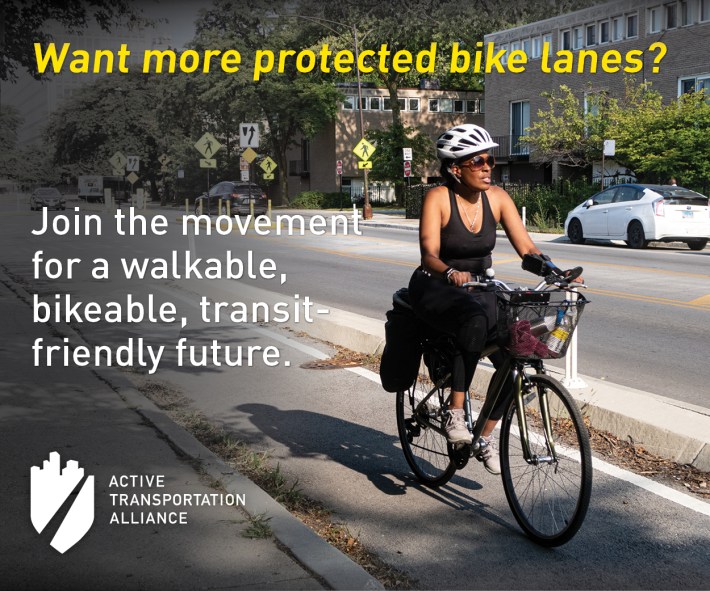
At this week's final CTA board meeting of 2024, the directors approved several ordinances. Most notably, the CTA and DePaul University’s Driehaus College of Business agreed to launch a pair of pilot programs to help small minority-owned small businesses win contracts with the transit agency.
Near the end of the hearing, embattled agency president Dorval Carter Jr. presented a glass-half-full take of the agency's 2024 performance, and discussed plans for 2025. But the directors felt that this year was more of a mixed bag.
One topic that was on the meeting agenda, but not actually discussed, was the extension of intergovernmental agreements with the Chicago, Oak Park, Forest Park, and Evanston police departments. CTA spokesperson Catherine Hosinski told Streetsblog that subject should be on the agenda again in January.
DePaul/CTA Partnership
Whenever there is any kind of major CTA project in Black and/or Latino communities, there are always two inevitable questions: Will it create jobs for local residents, and will it provide opportunities for local, minority-owned businesses? This issue is certainly relevant as the CTA gears up for the long-awaited Red Line Extension to the Far South Side. The agreement with DePaul is part of the agency's effort to address the second issue.
Carter told the board that the agency is "on target" to secure a $2 billion Federal Transit Administration grant – needed in order to start RLE construction – in January, before Joe Biden leaves office.
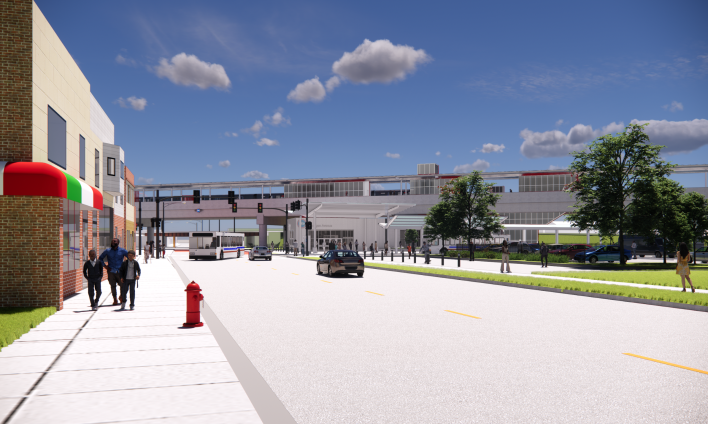
The first DePaul pilot program will have business students work with five-to-seven small enterprises pre-selected by the CTA through its existing Building Small Businesses program. Under faculty supervision, the students will help businesses get capital funding, as well as back-of-the-office support and technical assistance. The entrepreneurs will also get "critical insights to compete for CTA contracts and grow sustainably."
In a CTA press release about the program, Driehaus College of Business Dean Sulin Ba stated that the program is a "win-win opportunity." She added, "Our students will gain hands-on experience solving real-world business challenges, and CTA’s DBE firms will receive expert support to strengthen their operations and expand their opportunities."
The second pilot program will look at the broader economic development picture. The South Michigan Avenue corridor in Roseland and West Pullman, two of the neighborhoods that the RLE will serve, has historically been a major Far South Side commercial hub. But like other major corridors in majority-Black communities, it has suffered from disinvestment, and it struggles to attract new businesses.
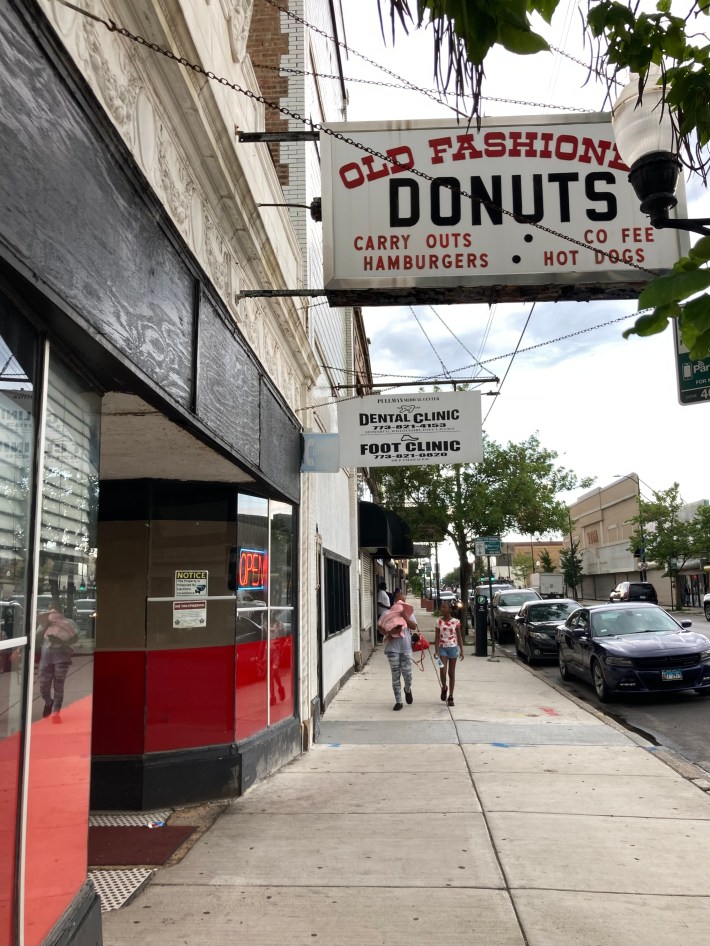
According to the CTA press statement, under this program, DePaul’s MBA students "will engage in Design Thinking to propose innovative solutions for transforming South Michigan Avenue into an economic anchor" for the entire South Side. That means looking into zoning, market conditions and equity issues, and developing recommendations for the Chicago Department of Planning and Development.
Driehaus College Professor of Entrepreneurship Dr. James Bort stated in the release that they "aim to foster the entrepreneurial innovation that can catalyze Chicago’s next generation of equitable growth and expand opportunities for all Chicagoans."
Carter and Board reflections
This spring, Illinois legislators proposed the Metropolitan Mobility Authority act, which would combine the Regional Transportation Authority, CTA, Metra, and Pace into a single agency. It would be the biggest Chicagoland transit restructuring since the RTA Act of 1983, which established what evolved into Metra and Pace, and gave the RTA oversight over the CTA budget and federal grants. CTA service has seen some improvement this year, but concerns about crime, on-time performance, and bus bunching remained.
During his report to the board, Carter gave a year-in-review analysis that, like all of his reports, painted a positive picture, stating that ridership is growing, staffing of buses is at pre-pandemic levels, and 'L' operator staffing is on track to reach pre-COVID numbers within the next few weeks. Carter also touted CTA service to the Democratic National Convention, the (re)opening of the Damen Green Line station, and the launch of a new "innovation hub" last spring. "I believe our agency has a great deal to be proud of as we look at the work we’ve done over the past year," he said.
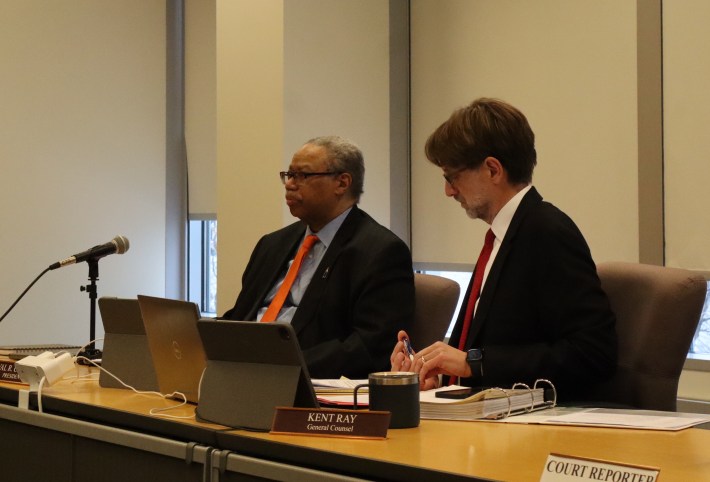
Carter added that in 2025, "CTA will surpass 2024 levels of service" and see increased service frequencies on buses "all day, every day," not just during weekday rush hour. He said that includes increasing night owl service, the pared-down network of CTA buses, plus the Red and Blue lines, that operate "until the rooster crows."
Later during the meeting, board member Roberto Requejo mentioned that average bus headways are decreasing to ten minutes on some routes. Hosinski told the reporters in attendance that details about this improvement will be released next year, but it would affect busier routes at major corridors.
Carter also heralded the reopening of the Red Line's newly renovated Bryn Mawr, Berwyn, Argyle and Lawrence stations, as well as renovations to make the Racine Blue stop and Austin Green station ADA-compliant. And he touted the new cross-system Regional Day Pass, which, Streetsblog riders may recall, was supposed to launch this fall.
While the board members had plenty of positive things to say about positive things that happened on the CTA this year, unlike Carter, they didn’t shy away from discussing the negatives. Board Chair Lester Barclay mentioned "the tragic loss of four of our riders on the Blue Line," "persistent challenges to public safety" and struggles with "service frequency and reliability."
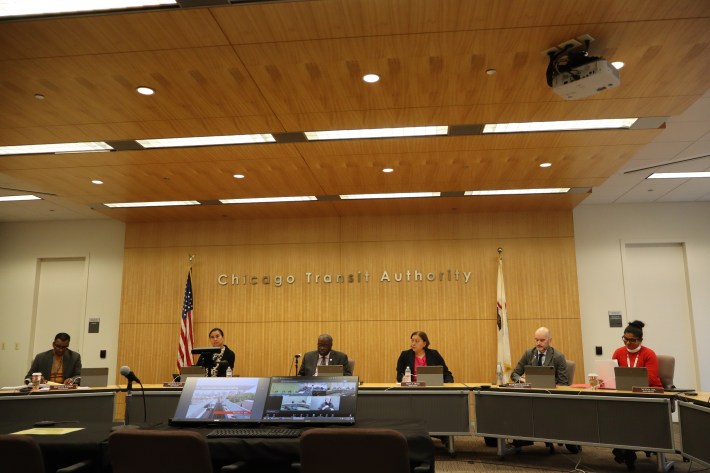
Director Michael Eaddy is a West Side pastor whose appointment by Mayor Brandon Johnson last spring led to increased scrutiny of Mayor Brandon Johnson's recommendation of allies with no public transportation expertise for transit boards. This culminated with another West Side clergyman, Pastor Ira Acree, withdrawing his name for consideration for the RTA board after admitting that he barely uses transit and was unaware of the region's looming $730 million transit funding cliff.
At this week's meeting, Eaddy said that sitting on the board has been "very exciting" and a good opportunity to "become better acquainted" with the ins and outs of the CTA. While he also acknowledged "challenges," he ended his remarks with praise for Carter. "There are other things that could be done, that we know are the challenges, and I want to commend you for the leadership that you have already displayed," he said.
Requejo lavished praise on CTA staff and applauded service improvements he has seen, but he also said he "would like to remind folks that we’re still very much challenged." He encouraged the CTA to listen to riders and transit advocate "who want to help.. Showing up as an open, transparent organization would be welcome."
Board member Rosa Ortiz said agreed with other board members' comments. "It’s been a hard year, but every year brings its own challenges and its own opportunities," she said.
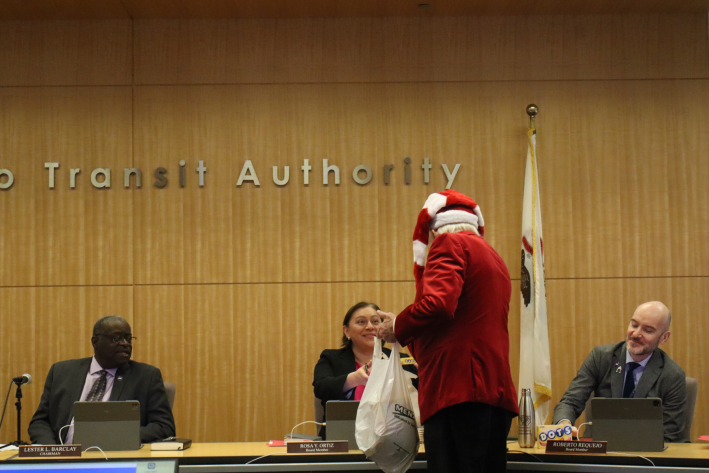
The meeting concluded on an upbeat note as a person in a Santa outfit, who had been been quietly sitting in the back, approached the dais and handed out candy to board members and staffers. Let's keep our fingers crossed that this foreshadows a sweeter year for CTA service in 2025.

Did you appreciate this post? Streetsblog Chicago is currently fundraising to help cover our 2025-26 budget. If you appreciate our reporting and advocacy on local sustainable transportation issues, please consider making a tax-deductible donation here. Thank you!






